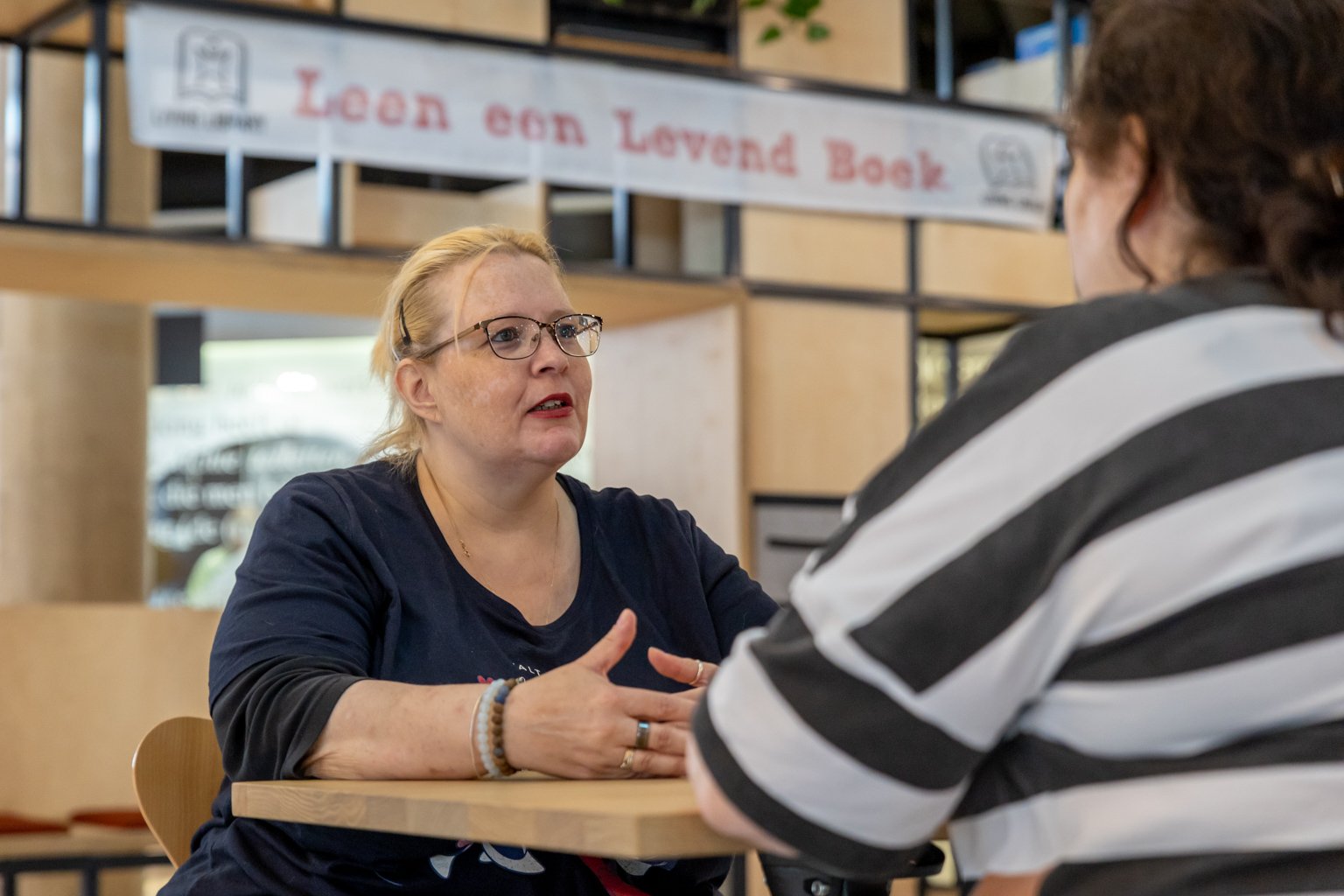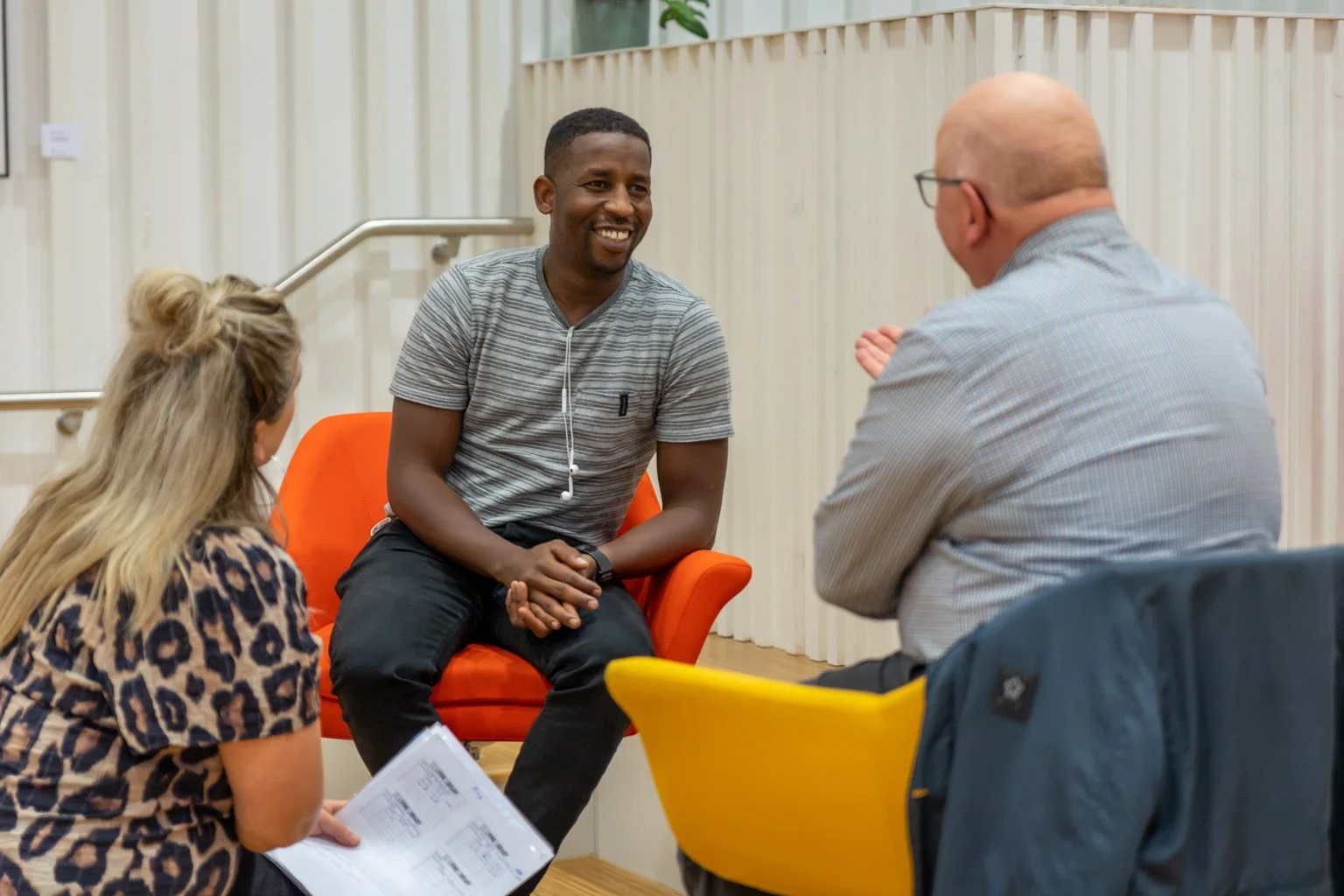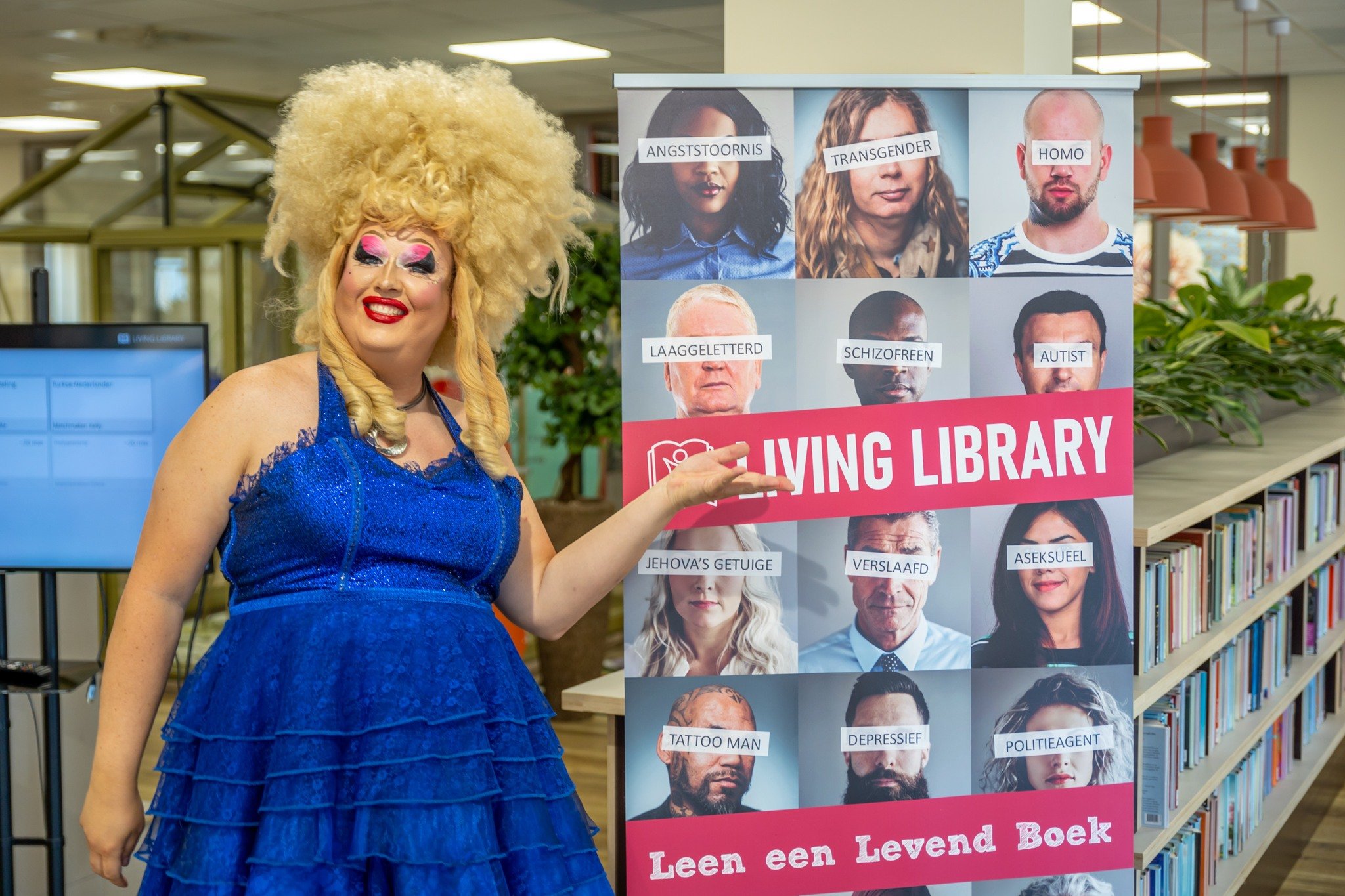Scientific research
Symposium
Please see the recording of our second symposium on 11-12-2025 here.
Introduction
After our first Living Library, we were 100% convinced that the method works: the responses by ‘readers’, ‘living books’ and volunteers were overwhelming. This was also reflected by the evaluation results. It became a standard practise that every reader fills out an evaluation form after a conversation, in order to get some basic feedback. You can see all evaluation reports here. But we also saw the need for independent, scientific research: are we actually successful in reaching our main goal of reducing prejudices?
By now, no less than five theses have been written about the Living Library in the Netherlands. To state it directly: they were all very positive about its effects. The studies are summarised below and you can download the original files. After these introductions some connected theories and concepts are outlined, such as the Contact Theory, World Travelling and Brave Space, mostly based on Lilja Kanerva’s research.
On September 14th, 2023, an online Symposium was held about the impact of the Living Library. The researchers presented their findings. It has been recorded: view it here.
Impact assessment
Two scientific papers have been written about the impact of the Living Library in the Netherlands, by two Master students Psychology (Anna Handke in 2017, University of Groningen en Öykü Cantürk in 2023, Radboud University). Both master theses explored the question whether the visitors' attitudes towards the minority group, with whom they had contact, improved after the conversation. The visitors were questioned in three parts: beforehand, directly afterwards and two weeks to one month later.
Both studies offer powerful support for the final goal of the Living Library. Already a short, voluntary conversation can change people’s presentation of minority groups significantly. Concluding, it can be stated that visiting a Living Library can be very useful to improve inter-group relations in our society. Important notes are the quality of the conversation and the motivation of the visitor. In the end, the studies promote the slogan of the Living Library: 'Don’t judge a book by its cover'.
Download here the thesis of Anna Handke and here the thesis of Öykü Cantürk.
Operating mechanisms
Lilja Kanerva, Master student Gender Studies at Utrecht University wrote her thesis (2023) about the operating mechanisms of the Living Library and she brings up two recommendations, based on in-depth interviews with ‘living books’ and ‘readers’. She states that the Living Library dialogue encounter can act as a catalyst for perception change by constructing a space for a respectful dialogue. It humanizes the living books and their subjects. Her advice is to promote the Living Library as widely as possible, so many different kinds of people can participate. She also recommends to invite people to choose a subject they do not have a lot of experience with.
However, an unexpected finding from her research was that when readers choose a subject they are familiar with, it can be experienced as very positive as well. For example: one reader conversed with the living book entitled ‘Survivor of sexual abuse’ and she stated the following:
“I also had some kind of abuse, but I still find it hard to say abuse, but I never spoke about it. Yeah. And then it was one of the first experiences speaking openly about it”.
For her it was a big relief to speak about this and it turned out to be an opening to reflect about it more, in the end together with her family and a psychologist. It can also be about friends, family or colleagues who are dealing with a certain situation. After the conversation, the reader can then understand and support them better. This type of ‘peer support’ is not an official goal of the Living Library, but it is seen as very valuable.
Download here the thesis of Lilja Kanerva.
Impact on Living books
Mafalda Couto, masterstudent ‘Social Challenges, Policies and Interventions’ at Utrecht University did her internship at the Living Library and with her master thesis (2024) she explored how migrants with a refugee background develop their identities through dialogue and storytelling. She has conducted thirteen interviews and has made observations during events.
One of the most important conclusions is that although stereotypes could reduce self-confidence, an exchange of stories leads to a reflection of the situation. It gives a new meaning to their identity and experiences, beyond the refugee-label. It can be seen as a form of narrative therapy. As Mafalda Couto says:
This paper strongly encourages the exchange of stories not only to promote a cohesive society and the integration of refugees but also for individual well-being.
Download the thesis of Mafalda Couto here.
Living Library at school
Leia Pickkers, HBO-student Social Work at InHolland University of Applied Sciences conducted a specific research to our Living Library at School program for her thesis, via literature review and interviews with pupils, teachers and living books. The results show that the Living Library has a positive influence on children regarding reducing prejudices and increasing understanding of others. For example, one pupil stated the following, after interacting with the book ‘Depression’:
“I always thought depression is very dark, and that the person would only like dark colors. And that you are always alone. Now I know it is basically some kind of disease and that you can get better”.
The thesis offers strong support for Living Library at School. Moreover, the goals of the Living Library closely connect with the goals of Citizenship Education in the Netherlands.
Download here the thesis van Leia Pickkers (in Dutch).
Supporting scientific theories
Several theories and concepts have been introduced by different scholars around the world to understand prejudices better and to find ways to combat them. They are described below, as it also gives a better understanding of the Living Library concept.
Prejudices
But first it is needed to understand what prejudices are. One of the most famous descriptions of prejudice comes from the American psychologist Gordon Allport (1954), describing prejudice as one's positive or negative feelings toward a concept, thing, or person based on personal experiences. Prejudices can be formed based on factors such as a person's sexual or gender identity, ethnicity, skin color, health or disability. Prejudice is known to be a major cause of discrimination and for conflicts in intergroup relations, which can have a significant negative impact on minority or marginalised groups. It could have dire consequences for their physical and mental well-being such as depression, suicidal thoughts, and anxiety.
Contact theory
The most known theory to combat prejudices is the intergroup contact theory, by Allport as well. The theory suggests that the contact between two social groups can have a positive impact. They get new knowledge, understand the other better and develop more empathy. There have been many studies that scientifically prove that prejudices decrease when different social groups come in contact with each other. The Living Library relies strongly on this theory, as readers can borrow a living book about a subject they have little experience with.
World Traveling
The Argentine philosopher Maria Lugones introduced the concept of ‘World Traveling’, which refers to conceptually traveling into another person’s world and way of seeing and experiencing life. In her article, Lugones encourages the use of ‘world’-traveling as a tool for resistance. ‘World’-traveling, according to Lugones, in the most productive case, helps one to understand another person better. She explains that when you travel to the other person’s world you can “understand what it is to be them and what it is to be ourselves in their eyes”. At the Living Library we often hear how personal conversations really change the view of the readers. Living books take readers on a journey by sharing their life story. This gives the readers an insight into what it means to be in that situation and allows the readers to perceive the subject through the words of the living book instead of through the mainstream narrative imposed by society. The readers can gain a more personal, human perspective into what the lived experience has been. This enables perception change to occur.
Autoethnographic texts
The American scholar Mary Louise Pratt coined the term ‘autoethnographic texts’, which are texts in which people undertake to describe themselves in ways that engage with representations others have made of them. It deconstructs the dominant narration of themselves, constructed by the oppressor. The living books use their position as the ‘other’ to re-narrate the story of being the ‘other’. Lilja Kanerva’s thesis quotes living book Remke (book title: Trans woman):
I always want to convey that it's okay to be transgender. You can be happy, you can be successful. So take your own path and be yourself”.
In this way, Remke is re-narrating the mainstream story that positions transgender people at the fringes of society through stigmatisation and discrimination. Remke’s autoethnographic text, a text of resistance, is her very real narrative about being happy and successful while also being transgender. She is using the position of the ‘so-called other’ to transform how the identity category of ‘transgender’ is viewed in the mainstream narrative by adding depth and diversity through sharing her own lived experience with the readers. Through the Living Library, it challenges a one-dimensional view on the subject.
Necropolitics
The Cameroonian historian Achille Mbembe explored this concept for the first time, to describe the power relations at play which grant some individuals as less human than others due to their identities which are considered marginal by the mainstream. The Living Library aims to challenge this dehumanisation of certain identities by bringing people together to reduce prejudice and discrimination. What is more, the living books who inhabit the position of the marginalised ‘other’ in the intervention intentionally use their position to challenge the mainstream narrative which locates them at the fringes of society.
Brave Space
The American diversity educators Brian Arao and Kristi Clemens published an article to introduce the concept of a Brave Space and to question the usefulness of ‘safe space’ by asking if safety is the right expectation for honest social justice dialogues. They use the term brave space instead of safe space because they question “the degree to which safety is an appropriate or reasonable expectation for any honest dialogue about social justice”. They instead highlight the concept of brave space: as a space where common ground rules of communication apply but where the focus is on emphasizing the need for courage to have disagreements rather than the illusion of safety. This connects closely with the view of the Living Library, but at the same time the space should be as safe as possible, for example by reading the rules out loud, before every conversation. Both the reader and the living book can ask each other any question, but both also have the right not to answer a question. Both can also finish the conversation at any time. Downright disrespectful or threatening behavior is not tolerated in the brave space or the Living Library. By setting these rules in the informal setting of the Living Library, it does create a space where readers become aware that any question is welcome, if asked in a respectful way. This paves the way for a deep, meaningful conversation.












